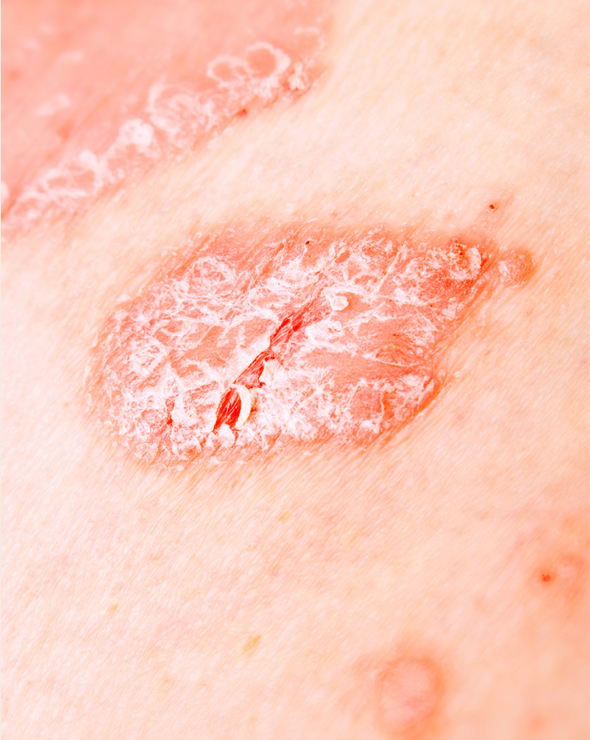Psoriasis and Holistic Healing
- Cami Grasher

- Jul 28, 2025
- 3 min read
Psoriasis, a chronic autoimmune condition, causes inflammation and skin plaque formation due to immune system overactivity. While genetics play a role, lifestyle and environmental factors often activate these genes. By focusing on holistic strategies, it’s possible to address the root causes of psoriasis and alleviate symptoms naturally.
The Role of Genetics in Psoriasis
A common misconception is that psoriasis is purely genetic. While certain genes may predispose individuals to the condition, these genes are not always active. Triggers such as poor diet, stress, and inflammation can “turn on” these genes.
Genome-Wide Association Studies (GWAS) have identified multiple genes linked to psoriasis, but lifestyle choices heavily influence whether these genes are activated. This concept, known as epigenetics, emphasizes how environmental factors impact gene expression, making it possible to manage psoriasis through holistic interventions.

The Gut-Immune Connection
Approximately 70-80% of the immune system resides in the gut, making gut health critical in managing inflammatory conditions like psoriasis. An imbalanced gut microbiome, caused by harmful bacteria or fungi, can trigger inflammation and worsen symptoms.
Steps to Improve Gut Health:
Support Beneficial Microbes: Incorporate probiotic-rich foods such as yogurt, kimchi, and sauerkraut to balance gut bacteria.
Avoid Trigger Foods: Limit sugar, refi ned carbs, and processed foods, which feed harmful bacteria and contribute to infl ammation.
Promote Regular Bowel Movements: Ensure proper digestion by consuming fiber-rich foods and staying hydrated.
By prioritizing gut health, you can address one of the primary drivers of psoriasis-related infl ammation.
Five Epigenetic Root Causes of Psoriasis
Managing psoriasis effectively requires addressing five key lifestyle factors, also known as the “big five”:
Poor Diet: Diet plays a significant role in controlling inflammation. Certain foods can exacerbate symptoms, while others can promote healing.
Foods to Avoid:
Sugary snacks and beverages
Processed foods with preservatives
Red meat and dairy products high in arachidonic acid
Foods to Include:
Anti-inflammatory options such as leafy greens, berries, and fatty fi sh
Phytonutrient-rich foods like broccoli, turmeric, and ginger
Healthy fats, such as olive oil and avocados
A diet focused on whole, unprocessed foods helps reduce inflammation and supports overall health.
Troubled Digestion: Impaired digestion can lead to an overgrowth of harmful microbes, which produce toxins that exacerbate psoriasis symptoms.
Strategies for Digestive Health:
Incorporate digestive enzymes to aid in breaking down complex proteins.
Avoid foods that cause bloating or discomfort, such as gluten or dairy (if sensitive).
Include fiber-rich foods to support gut motility and maintain a healthy microbiome.
Optimizing digestion is essential for reducing inflammation and improving skin health.
3. Diminished SleeP: Sleep is a critical yet often overlooked factor in managing psoriasis. Poor sleep can increase levels of inflammatory markers like TNF-alpha and IL-6.
Tips for Better Sleep:
Establish a consistent sleep schedule.
Create a relaxing bedtime routine, such as reading or meditation.
Limit caffeine and screen time before bed.
Prioritizing restorative sleep helps the body repair and reduces inflammation.
4. Emotional Stress: Chronic stress is a significant trigger for psoriasis fl are-ups. Stress activates inflammatory pathways and disrupts hormonal balance, worsening symptoms.
Stress-Reduction Techniques:
Practice mindfulness through meditation or yoga.
Engage in activities you enjoy, such as hobbies or time in nature.
Seek support from friends, family, or a counselor when needed.
Managing stress is crucial for maintaining balance in the immune system and reducing fl are-ups.
5. Exercise Deficiency: Regular physical activity releases anti-inflammatory molecules and promotes a healthy gut microbiome. Exercise also helps manage stress, improves sleep, and supports overall well-being.
Exercise Tips for Psoriasis:
Choose low-impact activities, such as swimming or walking, to avoid joint stress.
Incorporate strength training to build muscle and support joint health.
Start with short sessions and gradually increase intensity.
Consistent movement can significantly improve psoriasis symptoms and overall health.
Additional Factors to Consider: Other factors that can influence psoriasis include:
Smoking: Smoking increases inflammation and weakens the immune system.
Dental Hygiene: Poor oral health can lead to systemic inflammation.
Vitamin D Deficiency: Low levels of vitamin D can impair immune function. Consider safe sun exposure or supplements to maintain optimal levels.
Addressing these additional factors can further enhance your efforts to manage psoriasis naturally.
Taking Control of Psoriasis Naturally
Psoriasis management is about more than genetics. By addressing the “big five” factors—diet, digestion, sleep, stress, and exercise—you can take proactive steps to reduce inflammation and improve your quality of life.
With consistent effort and the right guidance, you can reclaim control over your health and enjoy a life free from psoriasis symptoms.
Psoriasis and Holistic Healing - Start Your Journey to Better Health Today!
Ready to finally reduce inflammation and start feeling like yourself again?Discover a personalized, root-cause approach that has helped countless women calm autoimmunity and restore balance.
👉 Click the link below to get started. Your body is ready — let’s help it thrive.




Comments